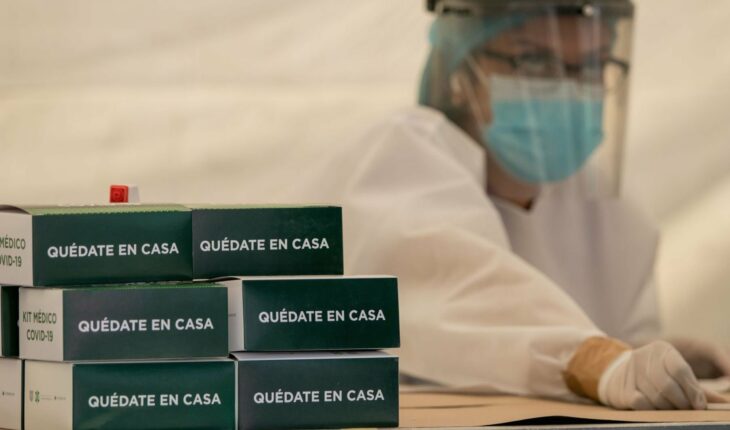The authors of the article “Ivermectin and the probabilities of hospitalization for COVID-19: evidence from a quasi-experimental analysis based on a public intervention in Mexico City” presented an appeal to the SocArXiv Steering Committee, following their withdrawal from the site.
“We respectfully want to address and refute each of the reasons they provided for withdrawing the article and requesting a hearing to make our case and answer any questions they may have,” reads a document shared by the Digital Agency for Public Innovation (ADIP).
You may be interested: Ivermectin prescribed in health centers for COVID-19; “they prescribe us a medicine that will not serve us”
On appeal, the authors deny that the text spreads disinformation, as the site noted in reporting its decision to remove it. In addition, they claimed, “SocArXiv’s role is not to judge on the content or quality of an article and, with this misrepresentation of our work, it overreaches its function of offering a ‘research infrastructure for public goods.'”
In addition, they assure that “the article was not used to justify the decision to implement a government program,” and that the decision to include ivermectin in the medical kits was made “based on a recommendation of a working group of national and international medical experts.”
They also emphasize that “months later, when the official recommendation changed, the government of Mexico City eliminated ivermectin from the kits. The article played no role in any of the decisions.”
Regarding SocArXiv’s claim that the drugs were given “apparently without due consent or appropriate ethical protections in accordance with human research standards,” they responded that they never recruited experimental subjects, and only used secondary (administrative) data, the analysis of which was given after the implementation of the policy, in addition to the fact that “the medical kits were provided by doctors.”
They explained that the work aimed to evaluate the public policy intervention of the medical kit and telephone follow-up, and that they conceive it as “a policy evaluation” and not as a “medical investigation”, as it was described by SocArXiv.
As for the alleged conflict of interest, mentioned by Philip Cohen, director of the site, they assured that they declared that they were employees of government agencies and that they do not have any kind of relationship with pharmaceutical companies.
“In addition, since our affiliations can skew the interpretation of the results, we publish the data and code so that anyone can use them as they see fit, come to their own conclusions, and advance knowledge,” the authors stress.
Therefore, they consider that their article “is being treated unfairly by editorial processes that are not part of the current policies of SocArXiv”, and asked the committee to reconsider the decision to delete the text.
Read more: ‘There was no experiment’: AMLO and López-Gatell defend the use of ivermectin
“SocArXiv does not do peer review”
This Monday, prior to the sending of the appeal, José Antonio Peña Merino, head of the ADIP and one of the authors of the text, announced that they would send the document to the SocArXiv committee, to which Philip Cohen responded that “it was just noise”, because the site “does not do peer review”.
Through his Twitter account, the director of SocArXiv indicated that “the fact that there is an article about our system does not mean that it is scientifically sound” and recommended that, if they want scientists to evaluate the work, they send it to a peer review, to some scientific publication.
As we explained previously (https://t.co/OMK7Q7s8hz), SocArXiv does not do peer review. We aren’t a journal. The fact that a paper is on our system does not mean it is scientifically sound. /2
— Philip N Cohen (@familyunequal) February 8, 2022
“However, if you believe that the ivermectin policy was ethical and effective, I suggest you turn over all program information, including the unedited data you collected and all supporting documents to an independent research organization for evaluation,” he wrote.
“We are a research archiving and dissemination service. You run a large website with many more resources than ours, just host the document there. Then, when it’s published in a journal, or an ethical review exonerates it, it can declare victory,” Cohen said, referring to ADIP and its head.
We are a service for archiving and disseminating research. You run a big website with a lot more resources than ours – just host the document there. Then when it’s published in a journal, or an ethics review exonerates you, you can declare victory. /6
— Philip N Cohen (@familyunequal) February 8, 2022
On February 4, the site SocArXiv decided to remove from its site the article, “Ivermectin and the probabilities of hospitalization for Covid-19: evidence of a quasi-experimental analysis based on a public intervention in Mexico City” through which the Government of Mexico City defended the delivery of ivermectin to patients sick with COVID-19.
This is an unprecedented action because the site — which had already spoken out about the misleading analysis — said it did not have a policy for removing documents.
In a text signed by Philip N. Cohen, it is explained that this article is potentially more harmful than others that the site has hosted.
“In light of the demonstrable harms such as those associated with this document, and in response to a communal surge begging us to act, we withdraw this document,” said the founder of SocArXiv.
What we do at Animal Político requires professional journalists, teamwork, dialogue with readers and something very important: independence. You can help us keep going. Be part of the team.
Subscribe to Animal Político, receive benefits and support free journalism.#YoSoyAnimal





